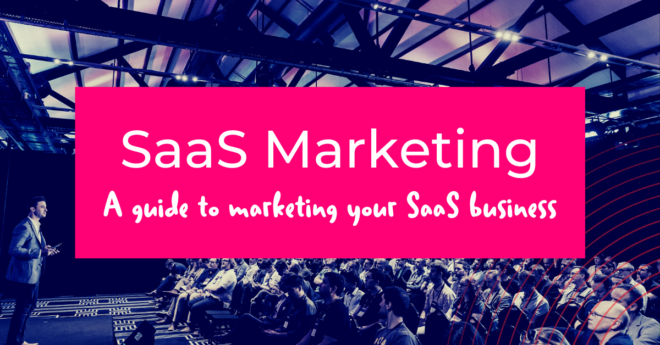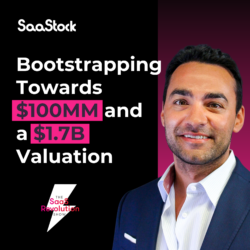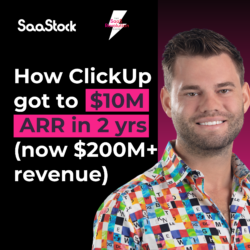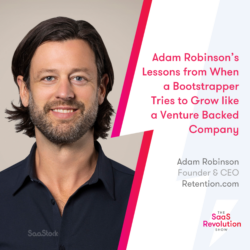This post is an excerpt from SaaS Marketing: A guide to marketing your SaaS business. Read on, or click here to download the full guide.
For growing SaaS companies, marketing is one of the most important ingredients fuelling your growth. Every company needs customers. And no matter how good your product is, you won’t get any customers if no-one knows you exist. That’s where marketing comes in.
This post will be most relevant to early and growth stage SaaS founders and executives who are just getting started with their marketing efforts. Maybe you’ve never ‘done’ marketing before, or maybe you’ve got a team in place but are struggling to see results from your marketing activities.
(If you’re a more experienced SaaS founder or SaaS marketer, but you’re looking for marketing inspiration, click here to watch some of the top marketing sessions from SaaStock 19. It’s the perfect chance to learn from some of our superstar speakers who graced the stage in Dublin.)
This post takes you through the essentials of marketing a SaaS solution: how it differs from traditional marketing, how to create a marketing strategy, and how to get started. It’ll help you identify your top priorities, understand how to measure success, and get started marketing your SaaS business.
Contents
- What is marketing?
- Why do SaaS companies need a marketing strategy?
- How is SaaS marketing different from other types of marketing?
- How do you get started with SaaS marketing?
- Choose a market
- Identify your ideal customers
- Agree on key messages and value proposition
- Set a budget
- Define success
- 4 steps for creating a SaaS marketing strategy
An introduction to SaaS marketing
What is marketing?
Let’s start with a definition:
Marketing
Noun
the action or business of promoting and selling products or services, including market research and advertising.
Marketing is how potential customers find out about your business. It covers everything from what you post on social media, to what goes on your banner at a trade show.
Marketing is a very broad discipline: there are dozens of different channels you could use. Trying to choose between channels, or tackling lots of channels at once, can be overwhelming. So remember: you don’t need to use every marketing channel available. Not all channels will be a good fit for your business.
As an example, here are a some of the biggest marketing channels:
- Your website
- Press and PR
- Social media
- Trade shows and events
- TV or radio advertising
- Email newsletters
- Pay per click advertising
And there are dozens more.
How is SaaS marketing different from other types of marketing?
To quote CoSchedule:
“SaaS marketing is the process of promoting and selling a software product with license, or recurring revenue, cashflow.”
There are several challenges unique to SaaS marketing:
- You’re selling something intangible, not a physical product
- You’re selling a service, not a product
- SaaS is a crowded market, especially if you’re moving into an already established category
- You’re competing against other startups – and also the status quo, people’s established ways of working and solving whatever problem your SaaS solves.
But there’s one thing unique to SaaS that makes marketing particularly important. And that’s the way it generates revenue.
Recurring revenue is the lifeblood of any SaaS business:
“Recurring revenue is the heart of every subscription business, and a key reason for the explosion of SaaS as a business model in recent years.” – ChartMogul
This means customer retention is critical – perhaps more so than in any other industry. Your marketing has to cater for a much longer customer lifecycle than in other industries. Not only do you need to attract customers in the first place, you also need to keep them engaged with your product and convinced of the value you’re providing.
You’re marketing for new, existing, and former customers – all at once.
So why do SaaS companies need a marketing strategy?
Competition in the SaaS space is fierce – and it’s going to get tougher in the years ahead:
Cisco Global Cloud Index states that 75% of cloud workloads will be SaaS by 2021.
Another study showed that the cloud computing market worldwide is expected to cross the $1 trillion mark by 2024.
SaaS companies need to find a way to stand out from the crowd. It’s no longer enough to “build it and they will come”. In the hugely competitive SaaS space, marketing is essential for telling people about your business, and showing why you’re the best option for your potential customers.
Here are three reasons marketing is essential for growing SaaS companies:
- For business growth – to grow your revenue, you either need to find new customers or convince the ones you’ve got to buy more from you. Marketing plays a critical role in both of these scenarios.
- For differentiation – given the choice, why should a potential customer choose you over your competitors? Marketing helps communicate your unique advantages to potential customers so they understand you’re the best option for what they need.
- For building trust – brand recognition is a powerful thing. How often do you hesitate when shopping online, faced with a brand you’ve never heard of before? Brand is a crucial part of marketing, and for SaaS startups brand building can be the difference between success and failure.
While it’s important to run marketing campaigns for the reasons outlined above, it’s just as important to have a clear marketing strategy in place. Here are three reasons why SaaS companies need a marketing strategy to guide your execution:
- To give your marketing direction – your marketing activities should all have a clear goal. Otherwise you run the risk of simply creating a load of content, or running a bunch of adverts with no purpose.
- To make the best use of your budget – unless you have infinite money, your marketing efforts will be run on a strict budget. A marketing strategy will make it clear how to divide that budget between different channels and activities.
- To define success – your top-level marketing strategy will be set in line with your business goals. You’ll then set targets for different channels or disciplines that feed in to your top-level goals. This ensures all your marketing activities are driving real business growth, rather than chasing vanity metrics.
Marketing should form an integral part of your startup business plan – just like your product roadmap and sales targets – and should be just as thought-out.
Key takeaways
For SaaS founders and executives, getting your marketing right – generating leads, and aligning with sales – is incredibly important. Here are five key takeaways to consider when planning your marketing activities:
- Not all marketing channels will be right for you. Don’t feel the need to do everything at once.
- Start small, and build out your marketing process as you grow and learn.
- Your marketing strategy is essential for success. Don’t be tempted to skip it and just ‘see what happens’.
- When choosing marketing channels and tactics, choose ones that offer a mix of long and short-term returns, so you’re not overly reliant on one channel for growth.
- Measure what matters. Focus on metrics that deliver real business growth, rather than chasing vanity metrics.







